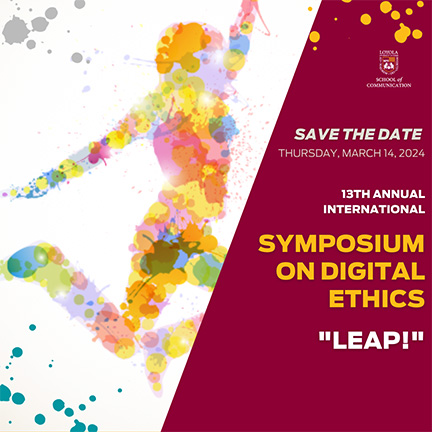Symposium Theme: "LEAP!"
Coinciding with the year 2024, the theme is “Leap!” which also acts as a metaphor for the leaps we must do across boundaries, borders, and disciplines to investigate the challenges brought about by emerging technologies and practices.
Program Schedule
8:30 Breakfast and Registration/Check-in
9:00am: Welcoming Remarks and Introduction to This Year’s Digital Ethics Symposium Theme: LEAP!
Executive Remarks: Robyn Mallett, Vice Provost of Academic Programs and Planning, Loyola University Chicago
Elizabeth Coffman, Interim Dean, School of Communication, Loyola University Chicago
Florence Chee, Director, The Center for Digital Ethics and Policy, School of Communication, Loyola University Chicago
9:15am Session 1: Leap! Into the Ethical Dilemmas of AI and Education, Teaching Strategies, and Information Policies
- Andrea L. Guzman, Associate Professor, Journalism, Department of Communication, Northern Illinois University "If AI writes my test, am I still a good professor?” The ethics of using AI as an educator
- Michael Burns, Associate Professor, Department of Biology, Loyola University Chicago Leaping across disciplines: Dramatic shifts in Generative AI and Higher Education
- Zachary McDowell, Assistant Professor, Department of Communication, University of Illinois at Chicago The Best-Laid Plans of Bots and Men: Hidden Ethical Dilemmas of Modern Information Policies
Moderated by Jill Geisler, Bill Plante Chair in Leadership and Media Integrity, School of Communication, Loyola University Chicago
SOC Ambassador and Student Discussant: Gareth Mullins, Political Science and Communication Studies double major.
10:30am Coffee Break
10:45am Session 2: Leap! Across Borders, Disciplinary Silos and Boundaries
- Matty Bakkeren, Founder, Momenthesis, Netherlands Digital ethics and technology leaps in industry practice
- Eryk Salvaggio, Artist, Cultural Critic, Techpolicy Researcher, Cyberneticforests How should we look at datasets in the age of generative AI? Interdisciplinary input from the Humanities, Social Science, and Design
- Fran Blumberg, Professor, Division of Psychological and Educational Services, Graduate School of Education, Fordham University Digital games are good for children...aren't they?
Moderated by June Macon, PhD Candidate, University of Illinois Chicago and Adjunct Instructor, School of Communication, Loyola University Chicago
LUNCH 12pm: Leap! Into Lunch, Business and Networking
1pm Session 3: Leap! Into our Keynote on AI, Playgrounds, and Children’s Rights
Sara M. Grimes, PhD, Professor, Bell University Labs (BUL) Chair in Human-Computer Interaction, Director, Kids Play Tech Lab, University of Toronto, Canada
- Keynote: Boundless Play! Or...Age-Bans and Data Brokers?
This talk given by Dr. Sara M. Grimes will discuss the issues around children and digital playgrounds (including AI-driven playgrounds and "child safety" systems) as sites of struggle where children's rights and wellbeing are imagined, realized, debated, and (often) threatened.
Moderated by Florence M. Chee, Associate Professor of Digital Communication, School of Communication, Loyola University Chicago
2:00pm Coffee Break
2:15pm Session 4: Leap! Into Ethics, Tech, and Law in Practice
- Nelson Rosario, Founder and Partner, Rosario Tech Law, LLC Existential Angst: Privacy, Property, and Power in the Age of Asymmetry
- Paul Giedraitis, CEO, Orgaimi Ethical challenges in LegalTech Entrepreneurship in an Age of AI
- Patricia Hureston Lee, Randy L. and Melvin R. Berlin Clinical Professor of Law and Director, Center for Business Law and the Business Law Clinic at Loyola Chicago Law School Stemming Societal Bias in Digital Formats
- Nicholas Soulakis, Associate Professor and Chair, Department of Health Informatics and Data Science, Loyola University Chicago Community-first informatics
Moderated by Bastiaan Vanacker, Associate Professor of Media and Law, School of Communication, Loyola University Chicago
3:45 Closing Remarks - Leaping Forward!
4pm Leap! Into our Networking Mixer
-=-5pm close-=-
Keynote: Boundless Play! Or...Age-Bans and Data Brokers?
Sara M. Grimes, PhD
Professor, Bell University Labs (BUL) Chair in Human-Computer Interaction, Director, Kids Play Tech Lab, University of Toronto
 Sara M. Grimes, PhD is the Bell Chair in Human-Computer Interaction, director of the Kids Play Tech lab, and a full Professor in the Faculty of Information at the University of Toronto (Toronto, Canada). She is the principal investigator of the Child Appropriate Game Design project, an international study of the potential and limits of age-appropriate design for digital games from a children’s rights perspective. She is also the lead author of a forthcoming CIFAR AI Insights policy brief on Responsible AI and Children. Previously, Dr. Grimes was part of the global team that conducted the children’s consultation for the United Nations Convention on the Rights of the Child’s General Comment 25 on Children’s Rights in the Digital Environment. She is the author of the award-winning book, Digital Playgrounds: The Hidden Politics of Children’s Online Play Spaces, Virtual Worlds, and Connected Games (2021, UTP).
Sara M. Grimes, PhD is the Bell Chair in Human-Computer Interaction, director of the Kids Play Tech lab, and a full Professor in the Faculty of Information at the University of Toronto (Toronto, Canada). She is the principal investigator of the Child Appropriate Game Design project, an international study of the potential and limits of age-appropriate design for digital games from a children’s rights perspective. She is also the lead author of a forthcoming CIFAR AI Insights policy brief on Responsible AI and Children. Previously, Dr. Grimes was part of the global team that conducted the children’s consultation for the United Nations Convention on the Rights of the Child’s General Comment 25 on Children’s Rights in the Digital Environment. She is the author of the award-winning book, Digital Playgrounds: The Hidden Politics of Children’s Online Play Spaces, Virtual Worlds, and Connected Games (2021, UTP).
13th Annual Symposium Speakers:
Matty Bakkeren: Digital Ethics and Technology Leaps
Founder, Momenthesis
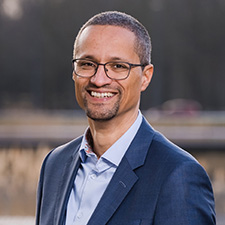 An experienced IT technology veteran with a 23-year track record at Intel corporation and passion for technology. Matty Bakkeren has successfully led EMEA partnership teams at Intel with Red Hat and Accenture and was Technical PR spokesperson for the company in the region. He's been part of product & technology introductions, as well as the design and realization of numerous infrastructure projects with multinational enterprises across a number of market segments. Matty has a unique ability to translate & explain highly technical concepts and turn them into digestible examples of its application and point to its business value. Matty currently runs his own consultancy company, Momenthesis.
An experienced IT technology veteran with a 23-year track record at Intel corporation and passion for technology. Matty Bakkeren has successfully led EMEA partnership teams at Intel with Red Hat and Accenture and was Technical PR spokesperson for the company in the region. He's been part of product & technology introductions, as well as the design and realization of numerous infrastructure projects with multinational enterprises across a number of market segments. Matty has a unique ability to translate & explain highly technical concepts and turn them into digestible examples of its application and point to its business value. Matty currently runs his own consultancy company, Momenthesis.
Fran Blumberg: Digital Games are Good for Children....Aren't They?
Professor, Graduate School of Education, Fordham University
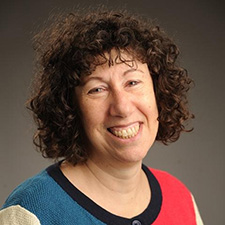 Fran Blumberg is a developmental psychologist and a Professor in the Division of Psychological and Educational Services within Fordham University’s Graduate School of Education. Her research concerns the study of children’s problem-solving skills in the context of formal and informal learning settings such as digital game play. Her work has been recognized via funding from the National Science Foundation, Spencer Foundation, and the Center for Curriculum Redesign. She is an editorial board member for journals such as Computers in Human Behavior,Psychology of Popular Media Culture, and Technology, Mind, and Behavior. She was recently part of the organizing team for the January, 2024 Ethical Games Conference (with Celia Hodent and Sebastian Detterding) and is a Senior Associate Editor for a special ACM Games issue that will reflect select papers from the conference. She is co-editor with Patricia Brooks of Cognitive Development in Digital Contexts (Academic Press, 2017) and lead author of the Society for Research in Child Development Social Policy Report, Digital games a context for children’s cognitive development: Research recommendations and policy considerations (2019).
Fran Blumberg is a developmental psychologist and a Professor in the Division of Psychological and Educational Services within Fordham University’s Graduate School of Education. Her research concerns the study of children’s problem-solving skills in the context of formal and informal learning settings such as digital game play. Her work has been recognized via funding from the National Science Foundation, Spencer Foundation, and the Center for Curriculum Redesign. She is an editorial board member for journals such as Computers in Human Behavior,Psychology of Popular Media Culture, and Technology, Mind, and Behavior. She was recently part of the organizing team for the January, 2024 Ethical Games Conference (with Celia Hodent and Sebastian Detterding) and is a Senior Associate Editor for a special ACM Games issue that will reflect select papers from the conference. She is co-editor with Patricia Brooks of Cognitive Development in Digital Contexts (Academic Press, 2017) and lead author of the Society for Research in Child Development Social Policy Report, Digital games a context for children’s cognitive development: Research recommendations and policy considerations (2019).
Michael Burns: Leaping Across Disciplines: Dramatic Shifts in Generative AI and Higher Education
Associate Professor, Department of Biology, Loyola University Chicago
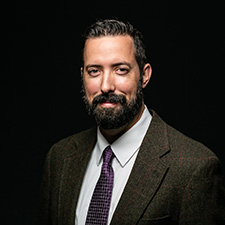 Dr. Michael Burns is an Associate Professor in the Biology Department at Loyola University Chicago. His biomedical research focuses on understanding interactions between bacteria and human cancers, using large sequencing datasets and machine learning. He also works extensively on interdisciplinary teaching and community outreach projects to foster good-faith dialogue between diverse groups and to promote science outreach within religious communities. His teaching also focuses heavily on emergent technologies and existential threats, including climate change, AI, and bioterrorism. As an Innovative Experiential Pedagogy Fellow within Loyola’s Center for Experiential Learning, Teaching, and Scholarship (CELTS), his teaching and research mentorship relies on evidence-based practices with the goal of providing students with real-world content and experiences. He is the 2023 recipient of the Langerbeck Award for Undergraduate Research Mentoring. Dr. Burns’s work has been featured in peer-reviewed journals including recently in the Journal of the American Academy of Dermatology, Nature Microbiology, Genome Biology and PLoS Genetics. He has been funded by the HHMI, NIH, and the Department of Defense, while his current work is supported by the NEH as well as the University of Notre Dame Institute for Advanced Study.
Dr. Michael Burns is an Associate Professor in the Biology Department at Loyola University Chicago. His biomedical research focuses on understanding interactions between bacteria and human cancers, using large sequencing datasets and machine learning. He also works extensively on interdisciplinary teaching and community outreach projects to foster good-faith dialogue between diverse groups and to promote science outreach within religious communities. His teaching also focuses heavily on emergent technologies and existential threats, including climate change, AI, and bioterrorism. As an Innovative Experiential Pedagogy Fellow within Loyola’s Center for Experiential Learning, Teaching, and Scholarship (CELTS), his teaching and research mentorship relies on evidence-based practices with the goal of providing students with real-world content and experiences. He is the 2023 recipient of the Langerbeck Award for Undergraduate Research Mentoring. Dr. Burns’s work has been featured in peer-reviewed journals including recently in the Journal of the American Academy of Dermatology, Nature Microbiology, Genome Biology and PLoS Genetics. He has been funded by the HHMI, NIH, and the Department of Defense, while his current work is supported by the NEH as well as the University of Notre Dame Institute for Advanced Study.
Paul Giedraitis: Ethical challenges in LegalTech Entrepreneurship in an Age of AI
CEO, Orgaimi
 Paul Giedraitis is a LegalTech entrepreneur, AI product expert, and technology solutions consultant based in Chicago, currently leading the team at Orgaimi - the world's most powerful client intelligence intelligence platform for law and accounting firms. His interests include machine learning, business intelligence, people analytics, and operational optimization with a focus on accelerating firm growth through predictive analysis of clients, services, and people. Much of his work in recent years has been focused on LegalTech, FinTech, and computational methods applied to professional services, banking and capital markets industries: revenue intelligence, people analytics, trade surveillance, regulatory compliance, risk management, high-frequency trading, options / derivatives, and international payments technology. He has an educational background in electrical engineering and computer science with 10+ years experience in quantitative modeling, software development, electronic systems design, defense industry applications, and semiconductor physics research.
Paul Giedraitis is a LegalTech entrepreneur, AI product expert, and technology solutions consultant based in Chicago, currently leading the team at Orgaimi - the world's most powerful client intelligence intelligence platform for law and accounting firms. His interests include machine learning, business intelligence, people analytics, and operational optimization with a focus on accelerating firm growth through predictive analysis of clients, services, and people. Much of his work in recent years has been focused on LegalTech, FinTech, and computational methods applied to professional services, banking and capital markets industries: revenue intelligence, people analytics, trade surveillance, regulatory compliance, risk management, high-frequency trading, options / derivatives, and international payments technology. He has an educational background in electrical engineering and computer science with 10+ years experience in quantitative modeling, software development, electronic systems design, defense industry applications, and semiconductor physics research.
Andrea L. Guzman: "If AI Writes My Test, Am I still A Good Professor?” The Ethics of Using AI as An Educator.
Associate Professor, Journalism, Department of Communication, Northern Illinois University
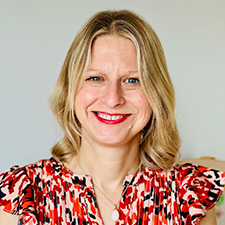 Andrea L. Guzman is a researcher, educator, and thought-leader helping scholars, organizations, and the public better understand how people interact with Artificial Intelligence and the social and ethical implications of these and related technologies, including voice-assistants (Siri, Alexa, etc), social robots, automated content-creation applications (such as news-writing programs for journalism), and generative AI (chatGPT). She has been integral in establishing Human-Machine Communication (HMC) as a recognized sub-field of Communication, in fostering a global network of HMC scholars, and advocating for the redesign of communication curricula to include social robots, AI, and HMC. As a former journalist, she is particularly interested in the effects of integrating AI, ML, and related applications into the newsroom. Her public outreach focuses on demystifying AI to help people understand how interactions with evolving technology impact their personal and professional lives.
Andrea L. Guzman is a researcher, educator, and thought-leader helping scholars, organizations, and the public better understand how people interact with Artificial Intelligence and the social and ethical implications of these and related technologies, including voice-assistants (Siri, Alexa, etc), social robots, automated content-creation applications (such as news-writing programs for journalism), and generative AI (chatGPT). She has been integral in establishing Human-Machine Communication (HMC) as a recognized sub-field of Communication, in fostering a global network of HMC scholars, and advocating for the redesign of communication curricula to include social robots, AI, and HMC. As a former journalist, she is particularly interested in the effects of integrating AI, ML, and related applications into the newsroom. Her public outreach focuses on demystifying AI to help people understand how interactions with evolving technology impact their personal and professional lives.
Patricia Lee: Stemming Societal Bias in Digital Formats
Randy L. and Melvin R. Berlin Clinical Professor of Law and Director, Center for Business Law and the Business Law Clinic at Loyola Chicago Law School
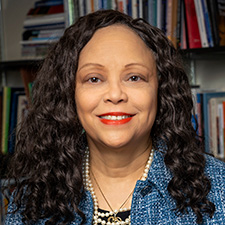 Patricia H. Lee is the Randy L. and Melvin R. Berlin Clinical Professor of Law and Director, Center for Business Law and the Business Law Clinic at Loyola Chicago Law School. Professor Lee teaches business law clinical/experiential courses and securities regulation.For nearly two decades prior to Loyola Law, Lee was a faculty member at several national law schools teaching students and directing entrepreneurship, intellectual property, community economic growth and transactional law clinical programs. Earlier in her career, Lee served as in-house corporate counsel and staff director for a Dow-30 corporation and she has won numerous individual awards during her career.
Patricia H. Lee is the Randy L. and Melvin R. Berlin Clinical Professor of Law and Director, Center for Business Law and the Business Law Clinic at Loyola Chicago Law School. Professor Lee teaches business law clinical/experiential courses and securities regulation.For nearly two decades prior to Loyola Law, Lee was a faculty member at several national law schools teaching students and directing entrepreneurship, intellectual property, community economic growth and transactional law clinical programs. Earlier in her career, Lee served as in-house corporate counsel and staff director for a Dow-30 corporation and she has won numerous individual awards during her career.
Zachary McDowell: The Best-Laid Plans of Bots and Men: Hidden Ethical Dilemmas of Modern Information Policies
Assistant Professor, Department of Communication, University of Illinois at Chicago
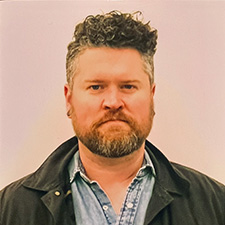 Zachary J McDowell is an Assistant Professor in the Department of Communication at the University of Illinois, Chicago. His research focuses on access and advocacy in digitally mediated peer production spaces. In particular, Zach’s research focuses on digital literacy, self-efficacy, and how digitally mediated tools, particularly Wikipedia, shape these areas of inquiry. He is the editor of the diamond open-access journal communication +1 and the author of ‘Wikipedia and the Representation of Reality’ (co-authored by Matthew Vetter). He is currently writing two books, Wikipedia and Beyond: Open Education for an Equitable Future (along with Matthew Vetter), as well as a currently untitled monograph on remix, artificial intelligence, and the political economies of cultural and informational re-use.
Zachary J McDowell is an Assistant Professor in the Department of Communication at the University of Illinois, Chicago. His research focuses on access and advocacy in digitally mediated peer production spaces. In particular, Zach’s research focuses on digital literacy, self-efficacy, and how digitally mediated tools, particularly Wikipedia, shape these areas of inquiry. He is the editor of the diamond open-access journal communication +1 and the author of ‘Wikipedia and the Representation of Reality’ (co-authored by Matthew Vetter). He is currently writing two books, Wikipedia and Beyond: Open Education for an Equitable Future (along with Matthew Vetter), as well as a currently untitled monograph on remix, artificial intelligence, and the political economies of cultural and informational re-use.
Nelson Rosario: Existential Angst: Privacy, Property, and Power in the Age of Asymmetry
Founder and Partner, Rosario Tech Law, LLC
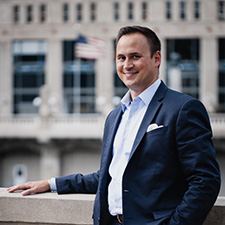 Nelson M. Rosario is a tech lawyer and adjunct law professor who has been quoted in the New York Times, TechCrunch, CoinDesk, Law360 and other publications. Mr. Rosario focuses on working with clients in the #blockchain #crypto #web3 #NFT space, #AI driven companies, and the private #space sector. Mr. Rosario is licensed to practice in the State of Illinois and before the United States Patent & Trademark Office. Mr. Rosario's practice covers commercial agreements, outside general counsel services, intellectual property issues, public policy work, and strategic counseling. Mr. Rosario is focused on working with clients dealing with frontier technologies that are changing the way we think about privacy, property, and power.
Nelson M. Rosario is a tech lawyer and adjunct law professor who has been quoted in the New York Times, TechCrunch, CoinDesk, Law360 and other publications. Mr. Rosario focuses on working with clients in the #blockchain #crypto #web3 #NFT space, #AI driven companies, and the private #space sector. Mr. Rosario is licensed to practice in the State of Illinois and before the United States Patent & Trademark Office. Mr. Rosario's practice covers commercial agreements, outside general counsel services, intellectual property issues, public policy work, and strategic counseling. Mr. Rosario is focused on working with clients dealing with frontier technologies that are changing the way we think about privacy, property, and power.
Eryk Salvaggio: How Should We Look at Datasets in the Age of Generative AI? Interdisciplinary Input From The Humanities, Social Science, and Design
Artist, Cultural Critic, Techpolicy Researcher, Cyberneticforests
 Eryk Salvaggio is an artist, cultural critic and tech policy researcher behind cyberneticforests.com. He has worked in tech policy, focused on AI and surveillance, since 2008, while making work that critiques and questions the logics of emerging technologies. He holds an MSc in Media and Communication from the London School of Economics and an MSc in Applied Cybernetics from the Australian National University. His work has appeared in Tech Policy Press, and in journals including Patterns, Leonardo, and Interactions of the ACM. He has spoken at SXSW, the hacker convention DEFCON, and teaches responsible AI at the Elisava Barcelona School of Design and Engineering.
Eryk Salvaggio is an artist, cultural critic and tech policy researcher behind cyberneticforests.com. He has worked in tech policy, focused on AI and surveillance, since 2008, while making work that critiques and questions the logics of emerging technologies. He holds an MSc in Media and Communication from the London School of Economics and an MSc in Applied Cybernetics from the Australian National University. His work has appeared in Tech Policy Press, and in journals including Patterns, Leonardo, and Interactions of the ACM. He has spoken at SXSW, the hacker convention DEFCON, and teaches responsible AI at the Elisava Barcelona School of Design and Engineering.
Nicholas Soulakis: Community-First Informatics
Associate Professor and Chair, Department of Health Informatics and Data Science, Loyola University Chicago
 Nicholas Soulakis is a public health scientist whose research focus lies at the intersection of epidemiology and informatics with an emphasis on understanding the expanding, data-rich world we live in and leveraging computationally intensive analytical techniques to monitor the health of communities. His current work is an expansion into the newly emerging field of community-first informatics; seeking to better understand the ascertainment of prevention networks and developing a more comprehensive scientific approach to understanding the dynamics of community engagement and health promotion. He also maintains an active research program in public health informatics, especially tracking emerging trends in community health using temporal and spatial surveillance methods, identifying new and novel methods of data collection and processing of electronic health record data, and examining electronic exchange of health information between healthcare providers and public health agencies.
Nicholas Soulakis is a public health scientist whose research focus lies at the intersection of epidemiology and informatics with an emphasis on understanding the expanding, data-rich world we live in and leveraging computationally intensive analytical techniques to monitor the health of communities. His current work is an expansion into the newly emerging field of community-first informatics; seeking to better understand the ascertainment of prevention networks and developing a more comprehensive scientific approach to understanding the dynamics of community engagement and health promotion. He also maintains an active research program in public health informatics, especially tracking emerging trends in community health using temporal and spatial surveillance methods, identifying new and novel methods of data collection and processing of electronic health record data, and examining electronic exchange of health information between healthcare providers and public health agencies.
